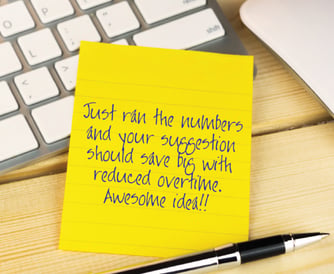
Practicing meaningful recognition
Just a few years ago I found myself in the position of reporting to a new manager who had been brought into our organization from the outside. I was managing our sales organization and had an hour-long meeting scheduled to provide an overview of our sales team, historic and current results, and our market strategy. I was understandably nervous heading into the meeting, but when the meeting concluded with a huge thank you and the comment “that was brilliant!”, I felt like I was on top of the world. If you know me, you know that “brilliant” isn\’t a term that I hear about myself all too often!
My initial euphoria over the “brilliant” comment lasted about two days. By that point I attended 5-6 meetings and noticed that apparently everyone in the company was “brilliant”. Product update? Brilliant! Marketing report? Brilliant! Restroom on the left? Brilliant!
Numerous studies have demonstrated that employees want and need recognition. Recognition, when done properly, helps to reduce turnover, improve team effectiveness, and leads to improved individual performance. However, studies also show that even when managers do remember to give recognition, they often miss the mark by making two common mistakes:
- Blanket recognition – Lunch for the team, or gift cards to Starbucks for everyone are the workplace equivalent to “blue ribbons for all”. Does everyone really deserve recognition? For what? Rather than recognition, group rewards can become to be seen as entitlements.
- Scheduled recognition – Some leaders schedule a monthly, quarterly or even annual recognition event. By pooling everything together, it\’s easy to lose sight of individual contributions and the impact they\’ve had on the business.
At High Performing Culture, when we create a Fundamental surrounding recognition, we always talk about the importance of practicing meaningful recognition. In order for recognition to be meaningful, it should be:
- Honest – A “good job” or a “brilliant” comment are better than nothing, but not a whole lot better. When employees see recognition being dolled-out to everyone, the impact is lost – especially to those who really do go above and beyond. Reward what is truly great, impactful performance and you\’re more likely to see a repeat performance.
- Timely – when an employee does something worthy of recognition, don\’t wait! Reinforce and reward the behavior by recognizing him/her right away while the effort and impact are still fresh.
- Address the Impact – Take the time to specifically call out both the activity and the impact of that activity that\’s worthy of the recognition. That tells the person that you really understand and appreciate the value of their work.
How do you get better at meaningful recognition? How do you even remember to squeeze-in recognition when you have so many competing priorities and demands on your time? First, you have to adjust your thinking so that recognition isn\’t considered “soft stuff”. It\’s a basic need of every employee and it contributes to the success of your business. Second, you have to be relentless about making the time to do it. Schedule 15 minutes on your calendar twice a week – everyone has 30 minutes a week to dedicate to something proven to move the business forward.
it contributes to the success of your business. Second, you have to be relentless about making the time to do it. Schedule 15 minutes on your calendar twice a week – everyone has 30 minutes a week to dedicate to something proven to move the business forward.
I\’ve met at least 100 people who left organizations because of the lack of recognition of their efforts. I\’ve yet to meet even 1 person who left because of too much recognition. More than money, employees want to know that they make a difference and that their contributions are being noticed. Reinforce positive contributions by regularly extending meaningful acknowledgment and appreciation in all directions throughout your organization. If you\’d like to learn more about how to do this, just give us a call or shoot us an email.
%C2%AE-08.png?width=3812&height=693&name=CultureWise%20logo%20(horz)%C2%AE-08.png)